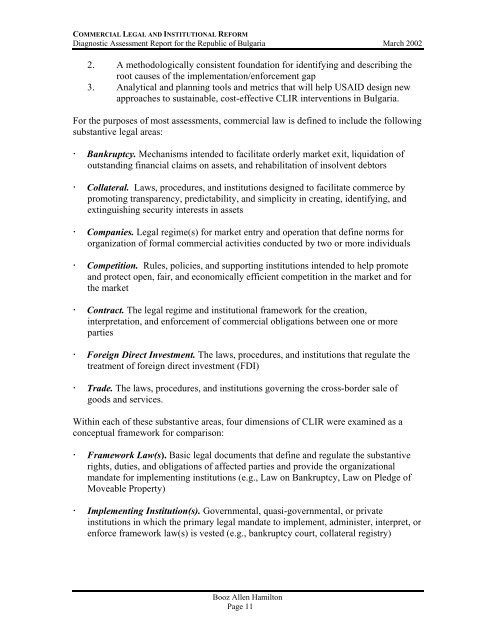Commercial Legal And Institutional Reform (CLIR) - Economic Growth
Commercial Legal And Institutional Reform (CLIR) - Economic Growth
Commercial Legal And Institutional Reform (CLIR) - Economic Growth
You also want an ePaper? Increase the reach of your titles
YUMPU automatically turns print PDFs into web optimized ePapers that Google loves.
COMMERCIAL LEGAL AND INSTITUTIONAL REFORM<br />
Diagnostic Assessment Report for the Republic of Bulgaria March 2002<br />
2. A methodologically consistent foundation for identifying and describing the<br />
root causes of the implementation/enforcement gap<br />
3. Analytical and planning tools and metrics that will help USAID design new<br />
approaches to sustainable, cost-effective <strong>CLIR</strong> interventions in Bulgaria.<br />
For the purposes of most assessments, commercial law is defined to include the following<br />
substantive legal areas:<br />
Bankruptcy. Mechanisms intended to facilitate orderly market exit, liquidation of<br />
outstanding financial claims on assets, and rehabilitation of insolvent debtors<br />
Collateral. Laws, procedures, and institutions designed to facilitate commerce by<br />
promoting transparency, predictability, and simplicity in creating, identifying, and<br />
extinguishing security interests in assets<br />
Companies. <strong>Legal</strong> regime(s) for market entry and operation that define norms for<br />
organization of formal commercial activities conducted by two or more individuals<br />
Competition. Rules, policies, and supporting institutions intended to help promote<br />
and protect open, fair, and economically efficient competition in the market and for<br />
the market<br />
Contract. The legal regime and institutional framework for the creation,<br />
interpretation, and enforcement of commercial obligations between one or more<br />
parties<br />
Foreign Direct Investment. The laws, procedures, and institutions that regulate the<br />
treatment of foreign direct investment (FDI)<br />
Trade. The laws, procedures, and institutions governing the cross-border sale of<br />
goods and services.<br />
Within each of these substantive areas, four dimensions of <strong>CLIR</strong> were examined as a<br />
conceptual framework for comparison:<br />
Framework Law(s). Basic legal documents that define and regulate the substantive<br />
rights, duties, and obligations of affected parties and provide the organizational<br />
mandate for implementing institutions (e.g., Law on Bankruptcy, Law on Pledge of<br />
Moveable Property)<br />
Implementing Institution(s). Governmental, quasi-governmental, or private<br />
institutions in which the primary legal mandate to implement, administer, interpret, or<br />
enforce framework law(s) is vested (e.g., bankruptcy court, collateral registry)<br />
Booz Allen Hamilton<br />
Page 11

















